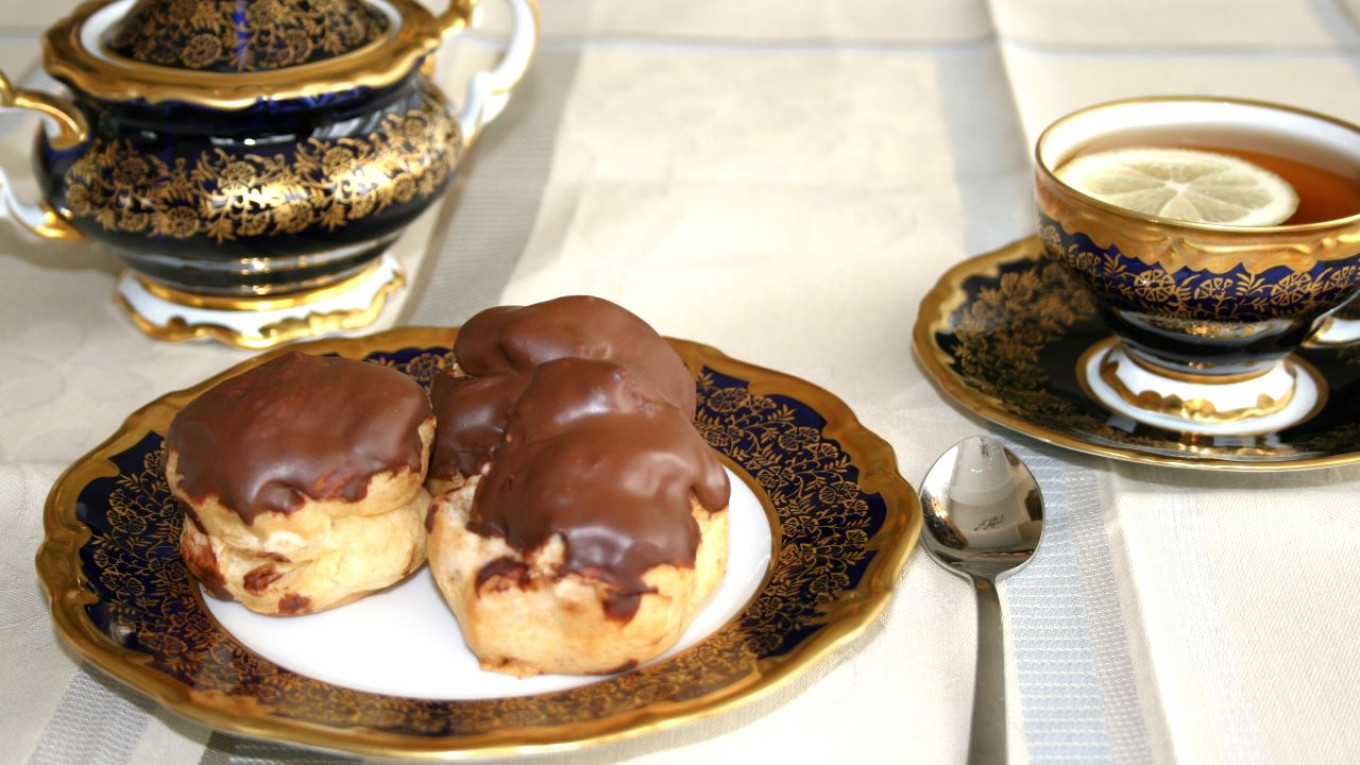The kitchen would seem to be a peaceful place. After all, pies and eclairs do not conceal hidden conflict and tragedy. But our history often presents us with surprises that even the most inventive writer could not dream up. Here is one such story.
"M. Conradi's Candy and Chocolate Factory" was founded in 1853 by Maurice Conradi, a native of Switzerland. In Russia, where he was called “Mavriky,” his enterprise soon became one of the largest confectionery factories in St. Petersburg. Conradi's stores were on Nevsky Prospekt — three of them! — as well as on other major streets and avenues of the city.
The 1901 price list gives the wholesale cost of over 20 items: cooking chocolate, cocoa, chocolate in boxes and "with books," chocolates and marshmallows, fruit candies, caramel, jelly, marmalade, pastilles, jelly, Montpensier (hard fruit candies) and gingerbread.
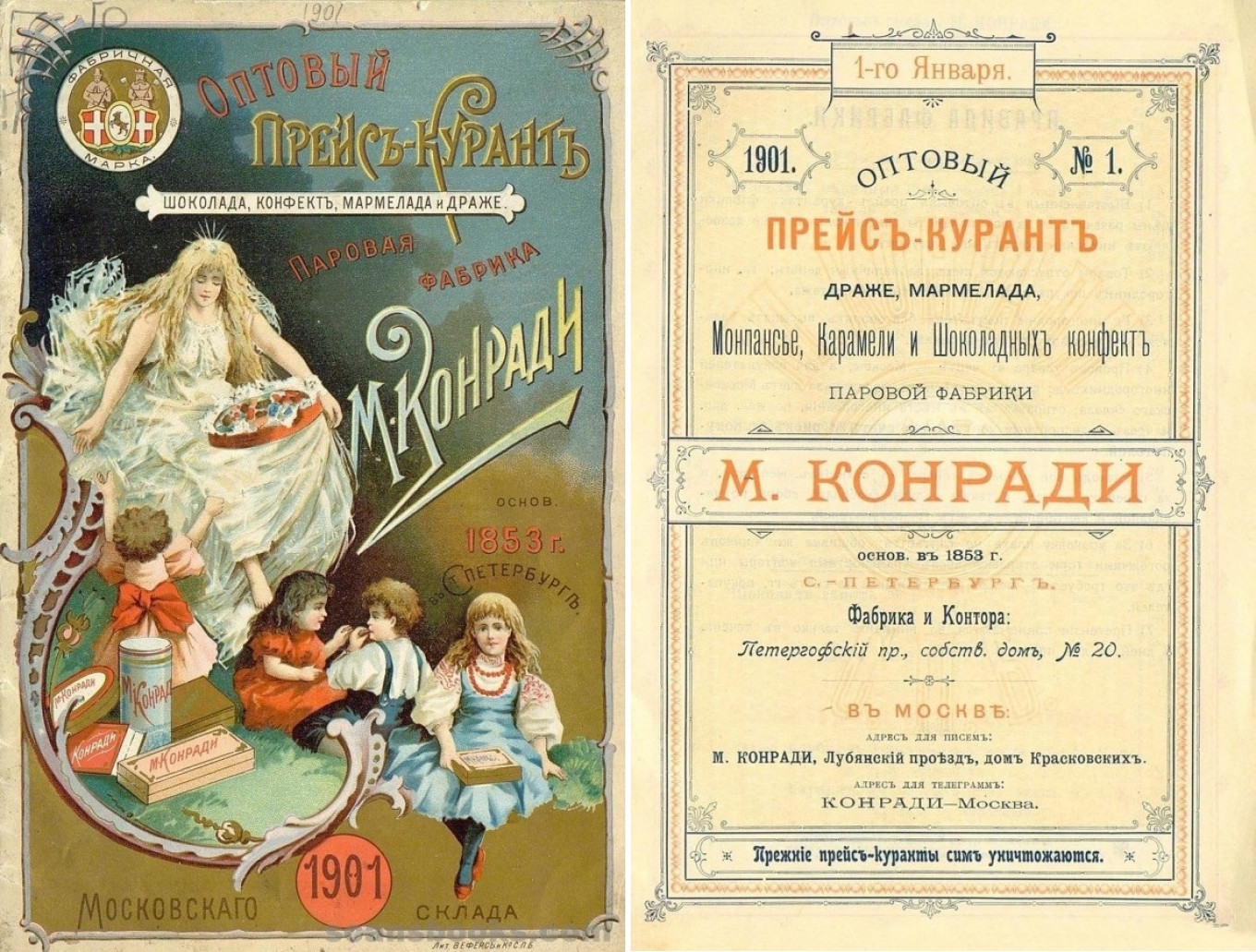
After the founder of the confectionery business died, his sons Eduard (until 1897) and Victor (from 1897 to 1917) became owners of the company. It was a very large family. One of its branches descended from another son of the enterprising Swiss confectioner, Maurice Johann. The eldest of his nine children (also named Maurice by tradition) chose a military career. After graduating from grammar school, he studied at the Pavlovsk Military School. In his second year at the Polytechnic Institute in 1914, he left for the front, which required the permission of Emperor Nicholas II, since Conradi was a Swiss citizen.
He received the rank of lieutenant. In battle he showed courage and selflessness. He was wounded and awarded the order of Saint George, 4th class. In January 1916 he graduated from officer school in Petrograd, after which he was sent to the Romanian front. In March 1918 a brigade of Russian volunteers under the command of Colonel of the General Staff Mikhail Drozdovsky (1881-1919) made their way to Novocherkassk on the Don despite brutal Romanian opposition. On their way the volunteer brigade managed to push back the Red Guard detachments from Rostov. But they didn’t have the forces to defend the city, and the "Drozdovtsy" had to leave and join with the main units of Denikin's Volunteer Army.
Their heroism was celebrated in a song.
Drozdovsky's closest associate was Colonel Anton Turkul. Captain Maurice Conradi served as his personal adjutant, and during that time news reached him from revolutionary St. Petersburg. In 1918 his uncle (the owner of the candy empire) was shot in retaliation for the murder of Bolshevik Commissar of Press and Propaganda Volodarsky. In November 1919, his father was taken to the Cheka, interrogated and beaten. He died from his wounds. Of Maurice's six brothers and sisters, two went missing during these years of “Red Terror.” Captain Conradi had reason to hate the Soviet authorities, and he fought them with all his might.
In March 1920, the First Volunteer Corps withdrew to Novorossiysk. "My 1st Regiment was ordered to the rearguard,” Turkul wrote in his memoirs. “Our regiment was separated from the retreating army by a day’s march. When I left village Popovichovskaya, the advanced units of Budyonny's cavalry army had caught up to us."
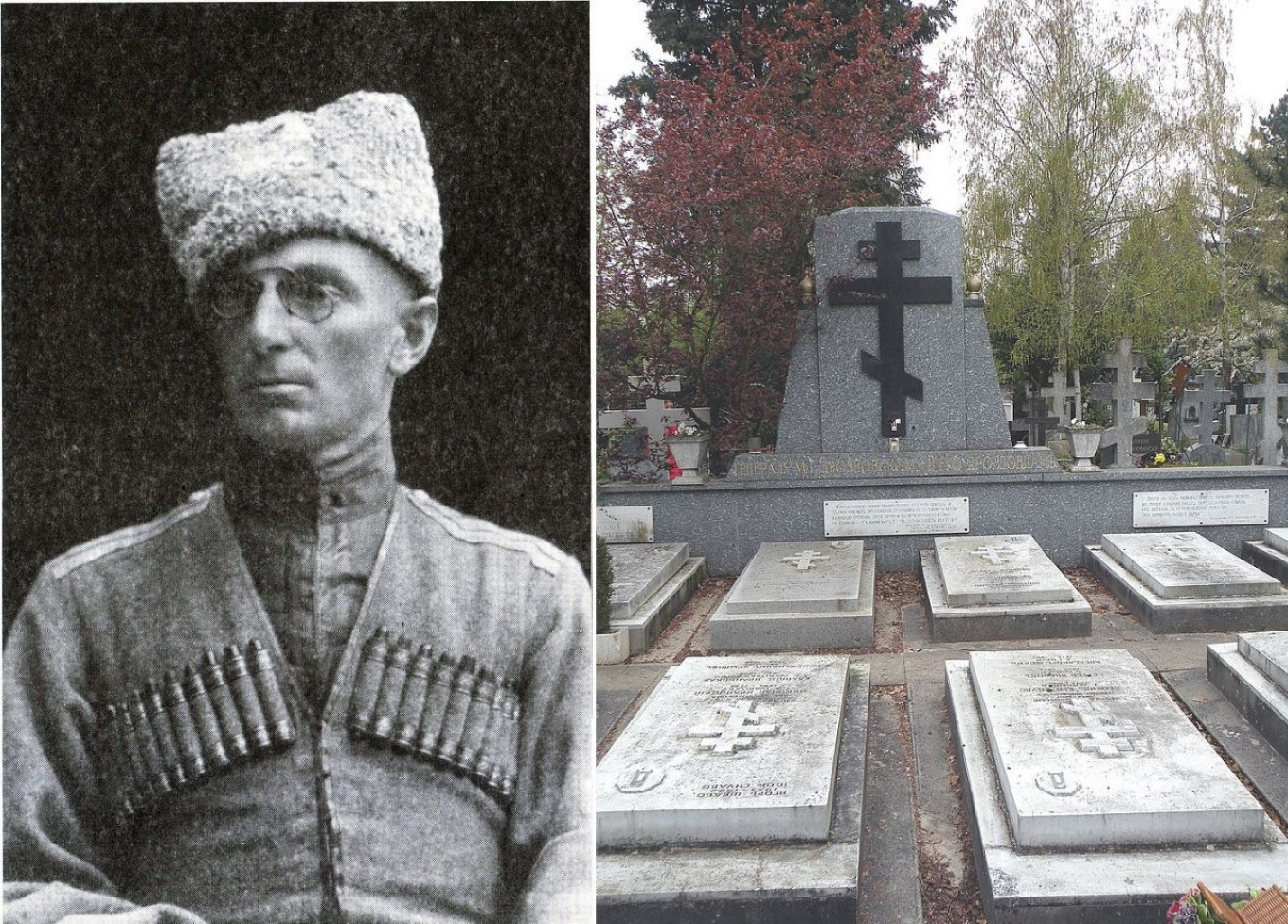
After evacuation from Crimea, Maurice Conradi found himself in a camp in Gallipoli, Turkey. In June 1921 he retired and moved with his wife Vladislava to Zurich. In Switzerland he was joined by his mother and four younger brothers, who managed to leave Soviet Russia by proving their Swiss citizenship.
Conradi’s story might have been lost among the tragedies of hundreds of thousands of Russian officers in foreign lands. But life took a different turn. In the spring of 1923, an international conference that was very important for Soviet Russia on regulating the Black Sea straits was held in Lausanne. After a two-month break, the Soviet delegation, headed by the Soviet ambassador to Italy, Vatslav Vorovsky, arrived at the conference. The delegation was staying at the Hotel Cecile, and on the evening of May 10 Vorovsky was dining with two of his closest assistants. Suddenly a stranger approached the table, drew a pistol, killed Vorovsky and wounded his dinner companions.
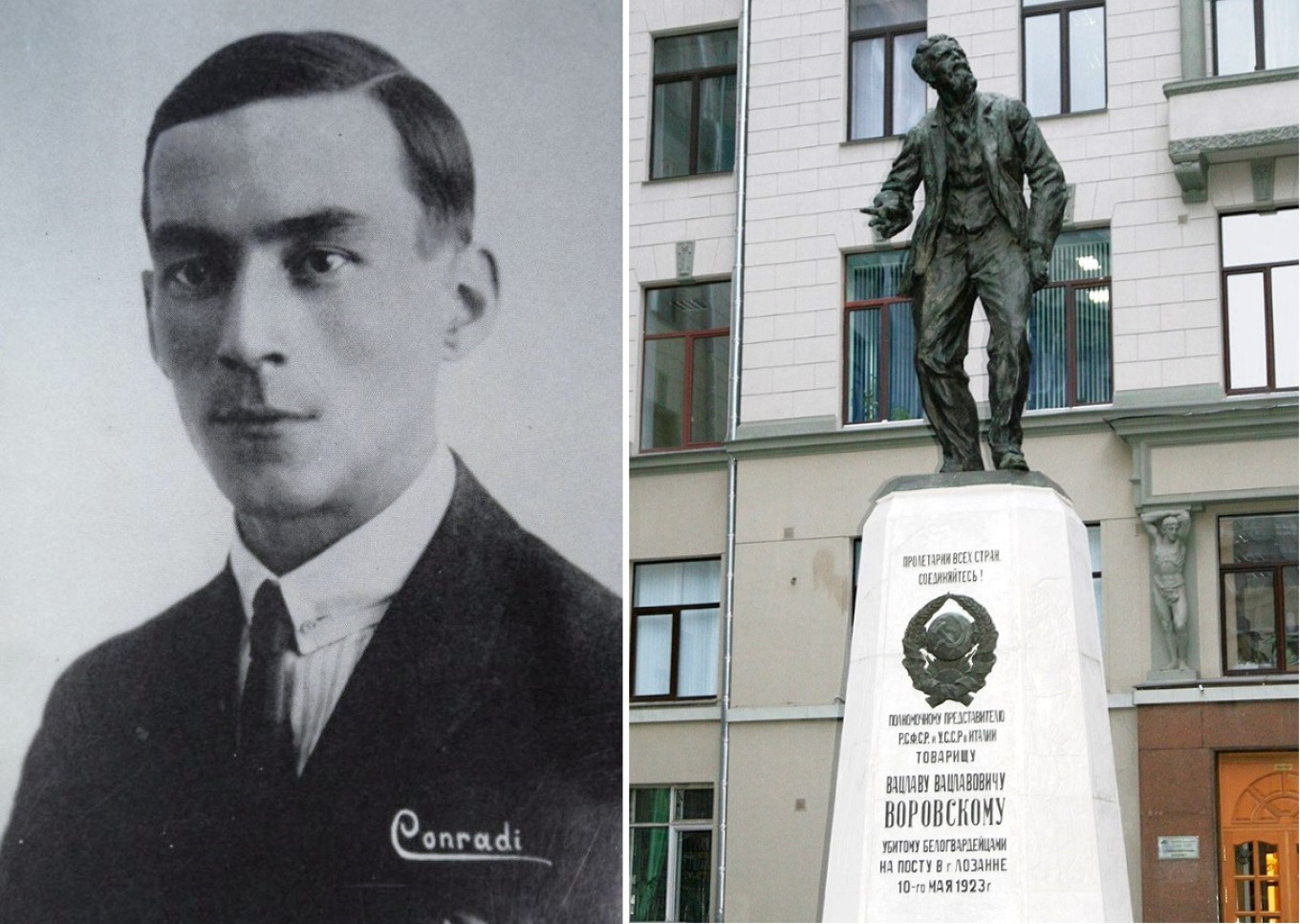
“I have done a good deed: the Russian Bolsheviks have ruined all Europe... This will do the whole world good," the man told the police when they arrived. His identity card showed the name Maurice Conradi.
***
Today, the only reminders of Conradi in Russia are museum exhibits: metal candy boxes and colorful chocolate wrappers. The chocolate factory did not survive the Soviet era. And Conradi's name was taboo in the Soviet Union for many decades. But remember one of the products sold in his catalog? Cooking chocolate. That's what we need for this, our favorite dessert. After all, the word "eclairs" also has the elusive flavor of that pre-revolutionary world.
To be precise, this receipe uses more of a choux pastry, because proper eclairs are tubes of custard dough. But in the home kitchen, it's more convenient to make round cakes. The main thing is that they are iced with chocolate ganache and filled with buttercream or custard. Buttercream is easily and deliciously made with condensed milk, but for the ganache you definitely need high-quality chocolate (70% cocoa content).
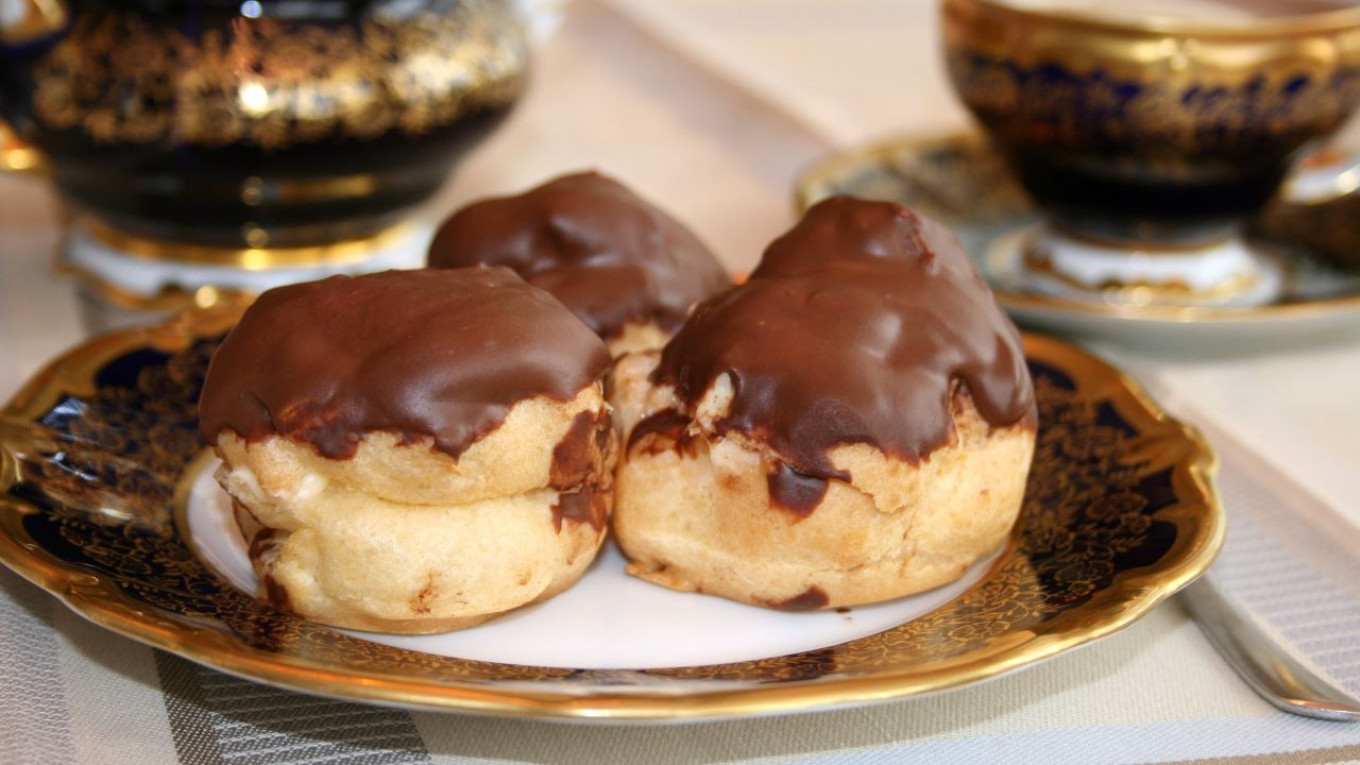
Eclairs à la Russe
Ingredients
For the pastry
- 100g (generous 7 Tbsp) butter
- 1 cup flour
- 1 cup water
- 4 medium eggs
- pinch of salt
For the cream filling
- 200g (1 c less 2 Tbsp or 2 sticks less 2 Tbsp) room temperature butter
- 240g (8.5 oz or ¾ c and 1.5 tsp) condensed milk
- 2 Tbsp brandy or liqueur.
For the chocolate coating - ganache
- 100g (3.5 oz) chocolate that is 70% cocoa
- 80 ml (1/3 c) 33% cream
Instructions
- Preheat oven to 210°C/410°F.
- Pour cold water, butter and a pinch of salt into a heavy-bottomed saucepan and bring to a boil.
- Pour all the flour into the boiling water, and stir it quickly on the stove, reducing the heat. While stirring, keep the dough on the stove a little longer, so that it dries out slightly. Stir until the dough is thick, homogeneous, and falls away from the walls of the pan.
- Remove from the stove and cool slightly.
- Then add the eggs, one at a time, thoroughly whisking in each egg until it is thoroughly mixed in. The dough becomes smooth and shiny.
- Line a baking tray with baking paper and use two teaspoons to drop small mounds of dough about 3 to 4 centimeters apart. In the oven the eclairs will increase in volume and hollow out. Bake for 10 minutes at 210°C/410°F, reduce the temperature to 180°C/350°F and bake for another 25 minutes.
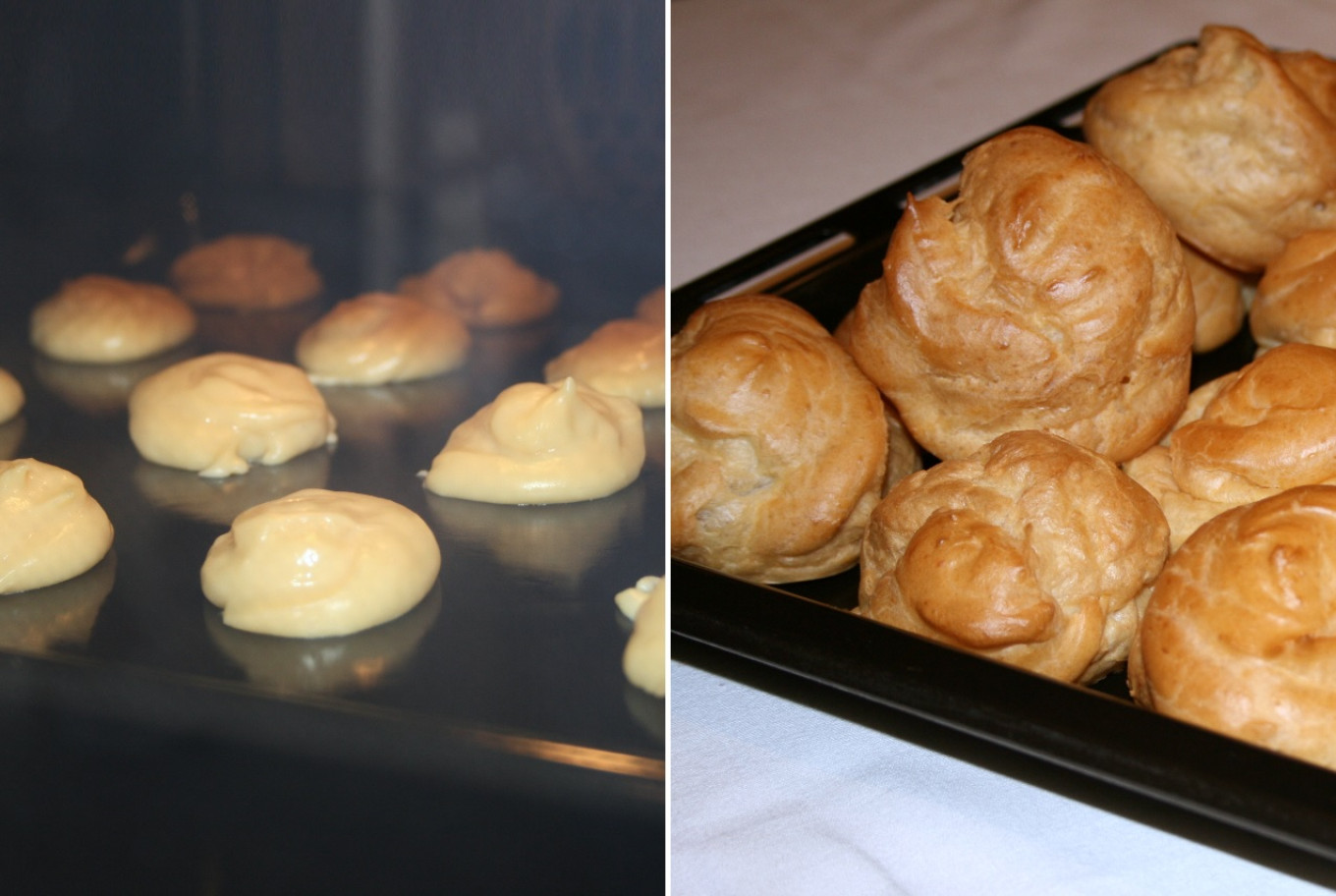
- For the cream, beat the butter until fluffy and homogeneous. While continuing to whip, add condensed milk in batches.
- When the eclairs are done, take them out of the oven and let them completely cool.
- Break the chocolate into small pieces and put in a small bowl.
- Pour the cream into a saucepan and bring to a boil.
- Pour the cream over the chocolate and stir with a whisk until it melts.
- Slice and fill the cakes with the cream and cover the top with chocolate.
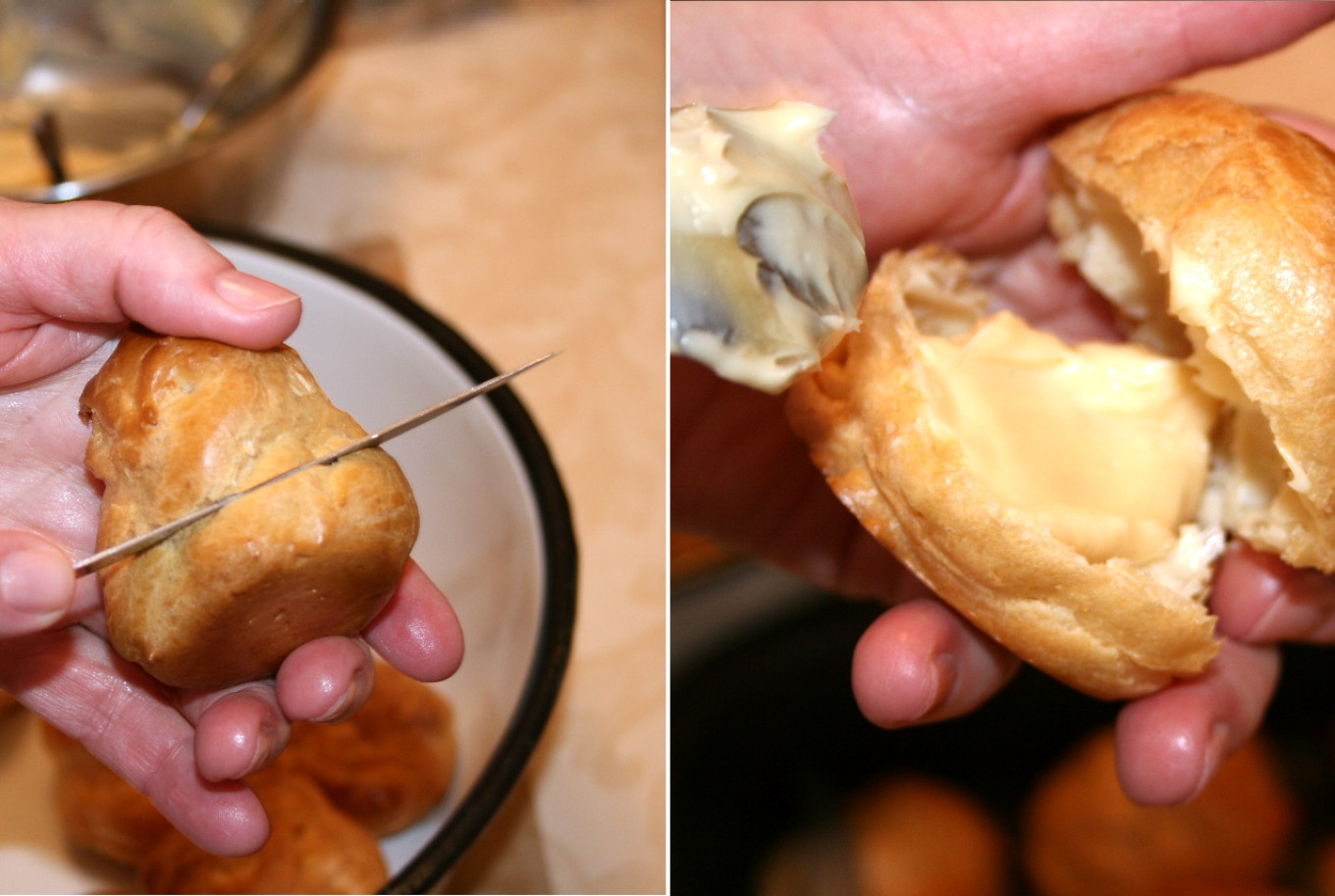
A Message from The Moscow Times:
Dear readers,
We are facing unprecedented challenges. Russia's Prosecutor General's Office has designated The Moscow Times as an "undesirable" organization, criminalizing our work and putting our staff at risk of prosecution. This follows our earlier unjust labeling as a "foreign agent."
These actions are direct attempts to silence independent journalism in Russia. The authorities claim our work "discredits the decisions of the Russian leadership." We see things differently: we strive to provide accurate, unbiased reporting on Russia.
We, the journalists of The Moscow Times, refuse to be silenced. But to continue our work, we need your help.
Your support, no matter how small, makes a world of difference. If you can, please support us monthly starting from just $2. It's quick to set up, and every contribution makes a significant impact.
By supporting The Moscow Times, you're defending open, independent journalism in the face of repression. Thank you for standing with us.
Remind me later.



